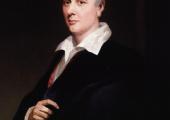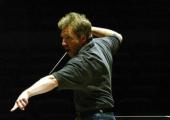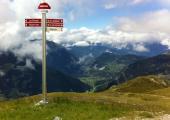When the sun rises on the Welsh Language and Heritage Centre, I step out into crisp morning air and a sort of Welsh plaza, a large walled lawn flanked on two sides by cottages. In all directions but one there is a sense of enclosure, rocky slopes heaving upwards. Nant Gwrtheyrn has been scooped out of the side of a mountain as if by giants. Nowhere in the country are peaks in such towering proximity to the sea. To the south-west there’s a long view along coastal cliffs as they turn a stern profile to the Irish Sea (pictured below). I wander down to a swanky new building, all glass gleam and woody shimmer, and enter a huge floorboarded dining room with only a single round table parked in the middle. A woman with short reddish hair and glasses is already eating breakfast.
“Bore da,” I say. (Good morning.)
“Er, bore da.” She gives me a look.
“O ble dych chi’n dod?” Where does she come from?
“Caerdydd. A chi?”
“Llundain.” She raises an eyebrow. There’s a pause.
“Do we have to speak in Welsh all the time?”
“Wrth gwrs!” I say. Course we bloody do.
We introduce ourselves. She’s called Roisin. I go over to the counter to get myself some breakfast and give us a breather. The door clinks open and into the vast dining room walks a tall and broad-framed man, with cropped hair, looking friendly but wary.
“Bore da,” he says.
“Bore da,” say Roisin and I.
“Ble yw’r brecwast?”
 “Yn y gornel.” I tell him breakfast is in the corner. He’s called David and comes from Conwy. We sit round the table and edge into a conversation as if walking out onto untested ice. There is some nervous laughter, much helpful nodding and considerable stopping preceded by starting. As I participate a thought flits into my head. Are they better than me? That would be most unsatisfactory. Or am I as good as them? I try to ignore it. The supremacist philosophies of Mr Darwin have no place here. Wales, lest I forget, was the wellspring of the equals sign, invented by Robert Recorde of Tenby in 1557. Still there’s early evidence that my word larder is an impressive resource. Roisin gives me a startled look as, buttering my toast, I roll out a percussive polysyllable which I then have to translate. Am I actually better than them at Welsh? The door opens again and another woman enters, short with fine fair hair and rimless glasses.
“Yn y gornel.” I tell him breakfast is in the corner. He’s called David and comes from Conwy. We sit round the table and edge into a conversation as if walking out onto untested ice. There is some nervous laughter, much helpful nodding and considerable stopping preceded by starting. As I participate a thought flits into my head. Are they better than me? That would be most unsatisfactory. Or am I as good as them? I try to ignore it. The supremacist philosophies of Mr Darwin have no place here. Wales, lest I forget, was the wellspring of the equals sign, invented by Robert Recorde of Tenby in 1557. Still there’s early evidence that my word larder is an impressive resource. Roisin gives me a startled look as, buttering my toast, I roll out a percussive polysyllable which I then have to translate. Am I actually better than them at Welsh? The door opens again and another woman enters, short with fine fair hair and rimless glasses.
“Bore da. Helen dw i.” We all exchange the relevant information. Helen is from Nottingham. No sooner does she reel off a sentence or two than my fantasies of spending the week at the top of the class are put back in the bottom drawer. In comes Richard, a man with a cheerful round face from Anglesey, then Jerry, a tall thin woman with ringletty hair from Bangor. Age wise we’re all in the same neighbourhood, mid-thirties to mid-forties. Apart from John, who shuffles in last. Wisps of grey hair frame a somehow mischievous face. John must be in his sixties by now. This is his third time at the Nant. He comes from somewhere in the Midlands but his Welsh sounds rooted in very ancient soil. He perorates for a while until a tall woman in a drapey woollen shawl enters wearing a look of benign, earnest concern. She announces herself as Pegi and gives an introductory speech about timetables and such like, length of lessons, the dining schedule, the shape of the five days to come. I understand about half of it.
So far not a word of anything other than Welsh has been spoken. Or not a sentence. We have started as we mean to continue. There will be no incursions from over the linguistic border. England and English could be as far away as Constantinople was to the men of the Third Crusade. And thus for these five days they must remain.
 The original function of Nant Gwrtheyrn grew out of the first Welsh Language Act in 1967, which acknowledged in law the equal status of English and Welsh. However, Welsh not often being the first language of the professional classes, somewhere was needed to nurture the linguistic skills of those working in public bodies. Since its inception in 1978, and as that brief widened to include anyone yearning to learn Welsh or improve what they already knew, over 25,000 students of the language have visited Nant Gwrtheyrn, from Cardiff where so many jobs in the media require bilingualism, from all over Wales and the UK, from countries across the world. In the summer months the weekly head count can be closer to 40. But for now, seven of us will adding ourselves to the tally.
The original function of Nant Gwrtheyrn grew out of the first Welsh Language Act in 1967, which acknowledged in law the equal status of English and Welsh. However, Welsh not often being the first language of the professional classes, somewhere was needed to nurture the linguistic skills of those working in public bodies. Since its inception in 1978, and as that brief widened to include anyone yearning to learn Welsh or improve what they already knew, over 25,000 students of the language have visited Nant Gwrtheyrn, from Cardiff where so many jobs in the media require bilingualism, from all over Wales and the UK, from countries across the world. In the summer months the weekly head count can be closer to 40. But for now, seven of us will adding ourselves to the tally.
The classroom is a converted Calvinistic Methodist chapel – in a previous incarnation, from the 1850s to the 1930s, the village of Porth-y-Nant was home to an isolated and self-contained granite quarry (village schoolchildren pictured above). The chapel, restored like the rest of the village from ruin, is now a tall light room in which four tables are laid out in a U shape. On the walls are posters about Welsh life, the Welsh language, Welsh celebrities. We take our seats and Pegi begins by asking us to outline our goals for the week. Most of the group need Welsh for professional reasons. Roisin is a town planner (cynllunydd tref) in South Wales, David works for the complaints department of Conwy Council (cwyno = to complain; cyngor = council/advice). Richard is a fireman (dyn tân). Helen is about to come and do probation work in Wales. For all of them Welsh is an increasingly vital tool. John, meanwhile, explains that he simply wants to spend a week speaking Welsh, there not being much call for it in the Midlands. Pegi turns to me.
“Beth amdanoch chi, Jasper?” What about me?
 “Mae rheswm rhyfedd ‘da fi,” I say. I’ve got a strange reason. “Dw i eisiau troi fy hunan mewn Cymro go-iawn.” I want to turn myself into a real Welshman. The mission statement evinces a perceptible double take from the group. I look around the room. If I can perceive a distinction, the women have instantly parked me as a classic narrow-focus male from the harmless end of the autistic spectrum, while I’m guessing Richard and David can’t quite believe I’ve volunteered for something so non-specific and unmeasurable.
“Mae rheswm rhyfedd ‘da fi,” I say. I’ve got a strange reason. “Dw i eisiau troi fy hunan mewn Cymro go-iawn.” I want to turn myself into a real Welshman. The mission statement evinces a perceptible double take from the group. I look around the room. If I can perceive a distinction, the women have instantly parked me as a classic narrow-focus male from the harmless end of the autistic spectrum, while I’m guessing Richard and David can’t quite believe I’ve volunteered for something so non-specific and unmeasurable.
“Diddorol iawn, Jasper!” says Pegi. Very interesting! She sounds like a reception teacher praising a five-year-old. It’s Gerry’s turn.
“Dw i’n hoffi just bloody speak as well as you lot.” Gerry has been sent here by her employers at Bangor University. It’s clear to her that they’ve booked her on the wrong week. She drives off at the end of the day. We never see her again. By five o’clock I’m wishing I could follow her out of Nant Gwrtheyrn.
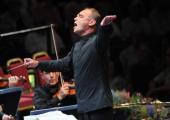

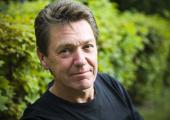
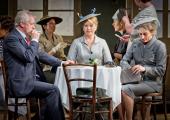


 “Yn y gornel.” I tell him breakfast is in the corner. He’s called David and comes from Conwy. We sit round the table and edge into a conversation as if walking out onto untested ice. There is some nervous laughter, much helpful nodding and considerable stopping preceded by starting. As I participate a thought flits into my head. Are they better than me? That would be most unsatisfactory. Or am I as good as them? I try to ignore it. The supremacist philosophies of Mr Darwin have no place here. Wales, lest I forget, was the wellspring of the equals sign, invented by Robert Recorde of Tenby in 1557. Still there’s early evidence that my word larder is an impressive resource. Roisin gives me a startled look as, buttering my toast, I roll out a percussive polysyllable which I then have to translate. Am I actually better than them at Welsh? The door opens again and another woman enters, short with fine fair hair and rimless glasses.
“Yn y gornel.” I tell him breakfast is in the corner. He’s called David and comes from Conwy. We sit round the table and edge into a conversation as if walking out onto untested ice. There is some nervous laughter, much helpful nodding and considerable stopping preceded by starting. As I participate a thought flits into my head. Are they better than me? That would be most unsatisfactory. Or am I as good as them? I try to ignore it. The supremacist philosophies of Mr Darwin have no place here. Wales, lest I forget, was the wellspring of the equals sign, invented by Robert Recorde of Tenby in 1557. Still there’s early evidence that my word larder is an impressive resource. Roisin gives me a startled look as, buttering my toast, I roll out a percussive polysyllable which I then have to translate. Am I actually better than them at Welsh? The door opens again and another woman enters, short with fine fair hair and rimless glasses. The original function of Nant Gwrtheyrn grew out of the first Welsh Language Act in 1967, which acknowledged in law the equal status of English and Welsh. However, Welsh not often being the first language of the professional classes, somewhere was needed to nurture the linguistic skills of those working in public bodies. Since its inception in 1978, and as that brief widened to include anyone yearning to learn Welsh or improve what they already knew, over 25,000 students of the language have visited Nant Gwrtheyrn, from Cardiff where so many jobs in the media require bilingualism, from all over Wales and the UK, from countries across the world. In the summer months the weekly head count can be closer to 40. But for now, seven of us will adding ourselves to the tally.
The original function of Nant Gwrtheyrn grew out of the first Welsh Language Act in 1967, which acknowledged in law the equal status of English and Welsh. However, Welsh not often being the first language of the professional classes, somewhere was needed to nurture the linguistic skills of those working in public bodies. Since its inception in 1978, and as that brief widened to include anyone yearning to learn Welsh or improve what they already knew, over 25,000 students of the language have visited Nant Gwrtheyrn, from Cardiff where so many jobs in the media require bilingualism, from all over Wales and the UK, from countries across the world. In the summer months the weekly head count can be closer to 40. But for now, seven of us will adding ourselves to the tally. “Mae rheswm rhyfedd ‘da fi,” I say. I’ve got a strange reason. “Dw i eisiau troi fy hunan mewn Cymro go-iawn.” I want to turn myself into a real Welshman. The mission statement evinces a perceptible double take from the group. I look around the room. If I can perceive a distinction, the women have instantly parked me as a classic narrow-focus male from the harmless end of the autistic spectrum, while I’m guessing Richard and David can’t quite believe I’ve volunteered for something so non-specific and unmeasurable.
“Mae rheswm rhyfedd ‘da fi,” I say. I’ve got a strange reason. “Dw i eisiau troi fy hunan mewn Cymro go-iawn.” I want to turn myself into a real Welshman. The mission statement evinces a perceptible double take from the group. I look around the room. If I can perceive a distinction, the women have instantly parked me as a classic narrow-focus male from the harmless end of the autistic spectrum, while I’m guessing Richard and David can’t quite believe I’ve volunteered for something so non-specific and unmeasurable.